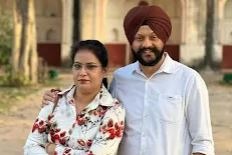Delhi BMW Crash: Why Did Accused Drive Victim 20 km Away Despite Wife’s Pleas for Nearby Hospital?
The Delhi BMW accident has taken a disturbing turn after revelations that the accused drove injured delivery agent Navjot Singh to a hospital 20 km away, ignoring his wife’s desperate requests to stop at a closer facility. The decision has raised troubling questions about intent, negligence, and the victim’s final moments.


By: Bharat Daily Samachar Date: 17 Sep,2025
A Shocking Twist in the Delhi BMW Case
The high-profile Delhi BMW accident case has once again sparked outrage across the nation. While the incident itself was already tragic, new revelations about the accused’s actions after the crash have left people stunned. Instead of rushing victim Navjot Singh, a delivery agent, to the nearest hospital, the accused drove nearly 20 kilometers to a facility farther away, ignoring the repeated pleas of Singh’s wife, who was present at the scene.
This choice has raised pressing questions: Why delay urgent medical care when every second mattered? Was it an act of negligence, panic, or deliberate intent?
The Accident That Shook Delhi
The crash took place on a busy Delhi road when a speeding BMW allegedly rammed into a two-wheeler, leaving Navjot Singh critically injured. Eyewitnesses recalled the terrifying moment, with bystanders rushing to help. Among them was Singh’s wife, who was riding along with him on the two-wheeler.
Accounts reveal that while she was in shock, her primary concern was saving her husband’s life. Multiple witnesses confirmed hearing her beg the driver to take Singh to the nearest hospital.
The 20-Kilometer Detour
Instead of driving to the nearest medical facility, which was only a few minutes away, the accused allegedly insisted on going to a hospital located 20 km from the accident site. The journey consumed precious time—time that could have meant the difference between life and death.
Navjot Singh was eventually declared dead on arrival, leaving his family devastated and the public demanding answers.
Wife’s Desperate Pleas Ignored
Singh’s wife later revealed that she begged the accused to stop at a nearby hospital. “I kept telling him to take my husband to the closest hospital. He was bleeding heavily. But he refused and said he would only go to the one he trusted,” she said in her statement to police.
Her words paint a heartbreaking picture of helplessness—watching her husband lose critical moments of medical attention while being driven farther and farther away.
Questions of Negligence and Intent
Legal experts say the decision to avoid the nearest hospital could play a crucial role in the investigation. Under Indian law, deliberate delay in providing medical assistance can be considered a form of criminal negligence.
Some speculate that the accused may have avoided nearby hospitals out of fear—perhaps of being caught, facing immediate police involvement, or because of panic. Others believe it could have been a calculated move to control the narrative by reaching a hospital of his choosing.
Whichever the case, public anger is mounting over what appears to be avoidable negligence.
Police and Legal Proceedings
Delhi Police have taken note of the wife’s statement and are investigating why the accused chose to ignore a closer hospital. Sources suggest that CCTV footage along the accident route and hospital entry logs are being examined to determine timelines.
The accused has already been booked for rash driving and causing death by negligence. With these new revelations, further charges may be added depending on how the case unfolds in court.
Public Outrage and Online Reactions
The case has sparked outrage on social media, where users have condemned the accused not just for reckless driving but for failing to prioritize the victim’s life. Hashtags like #JusticeForNavjot and #DelhiBMWCase are trending, with thousands demanding stricter punishments for such offenses.
Many netizens drew parallels with past high-profile accident cases, arguing that influential individuals often escape accountability while ordinary families are left to suffer.
Larger Debate: Road Safety and Responsibility
The Delhi BMW case also reignites the broader debate around road safety and accountability. Every year, thousands die in road accidents across India, many because of reckless driving or delays in medical treatment. Experts highlight the importance of the “Golden Hour”—the first 60 minutes after a traumatic injury—when timely medical care can significantly improve survival chances.
By ignoring this principle, the accused not only worsened Singh’s chances but also underlined how road crimes often involve layers of negligence beyond just the crash itself.
The Human Cost Behind the Headlines
For Navjot Singh’s family, this is not just another headline. He was a hardworking delivery agent, trying to make ends meet for his loved ones. His sudden and preventable death has left his wife and family shattered.
Their grief is amplified by the knowledge that perhaps, had he been taken to the nearest hospital immediately, he might have had a fighting chance.
Conclusion
The Delhi BMW crash is no longer being seen as just a case of reckless driving. The disturbing detail that the accused drove the victim 20 km away, ignoring urgent pleas, has turned it into a chilling example of how negligence can be as damaging as the accident itself.
As the investigation continues, the central question remains: Why suspend humanity when seconds could save a life? Until answers are found and accountability ensured, this case will remain a painful reminder of how justice and compassion often collide on India’s roads.
